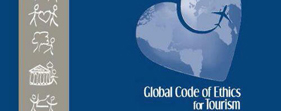Tourism ethics code becomes international convention

The member States of the UNWTO have now approved the historic UNWTO Framework Convention on Tourism Ethics.
The Convention, approved at the 22nd UNWTO General Assembly transforms the Code of Ethics for Tourism into an international convention, the first in the life of the Organization.
The Convention covers the responsibilities of all stakeholders in the development sustainable tourism, providing a framework that recommends an ethical and sustainable modus operandi, including the right to tourism, the freedom of movement for tourists and the rights of employees and professionals.
"In an interconnected world where the business volume of tourism equals or even surpasses that of oil exports, food products or automobiles, it is important to set out a legal framework to ensure that growth is dealt with responsibly and that it can be sustained over time. Tourism is a power that must be harnessed for the benefit of all," said the Chairman of the World Committee on Tourism Ethics (WCTE), Pascal Lamy.
Appointed as Chairman of the WTCE in 2013, Pascal Lamy, together with his colleagues in the Committee, has been instrumental in the process of presenting the Convention on Tourism Ethics to the 22nd UNWTO General Assembly.
"This is an historical moment for UNWTO, said the Secretary-General", Taleb Rifai. "The approval of the Convention is a strong legacy of the International Year of Sustainable Tourism for Development that we celebrate this year. It is also a strong sign that countries are committed to make tourism a force for a better future for all. It reinforces UNWTO institutional outreach in the UN system," he added.

The Global Code of Ethics for Tourism (GCET) is a comprehensive set of principles designed to guide key-players in tourism development. Addressed to governments, the travel industry, communities and tourists alike, it aims to help maximise the sector’s benefits while minimising its potentially negative impact on the environment, cultural heritage and societies across the globe.
The Code’s 10 principles amply cover the economic, social, cultural and environmental components of travel and tourism:
Article 1: Tourism’s contribution to mutual understanding and respect between peoples and societies
Article 2: Tourism as a vehicle for individual and collective fulfilment
Article 3: Tourism, a factor of sustainable development
Article 4: Tourism, a user of the cultural heritage of mankind and contributor to its enhancement
Article 5: Tourism, a beneficial activity for host countries and communities
Article 6: Obligations of stakeholders in tourism development
Article 7: Right to tourism
Article 8: Liberty of tourist movements
Article 9: Rights of the workers and entrepreneurs in the tourism industry
Article 10: Implementation of the principles of the Global Code of Ethics for Tourism
FULL TEXT of the Global Code of Ethics for Tourism HERE
"UNWTO is guided by the belief that tourism can make a meaningful contribution to people’s lives and our planet. This conviction is at the very heart of the Global Code of Ethics for Tourism, a roadmap for tourism development. I call on all to read, circulate and adopt the Code for the benefit of tourists, tour operators, host communities and their environments worldwide." Taleb Rifai, UNWTO Secretary-General.
Valere Tjolle
@ValereTjolle
 United Kingdom
United Kingdom United States
United States Asia Pacific
Asia Pacific












































Dozens fall ill in P&O Cruises ship outbreak
Turkish Airlines flight in emergency landing after pilot dies
Boy falls to death on cruise ship
Unexpected wave rocks cruise ship
Storm Lilian travel chaos as bank holiday flights cancelled